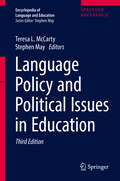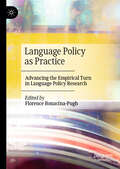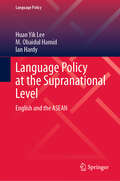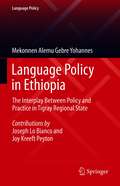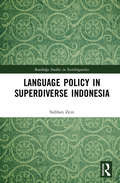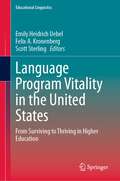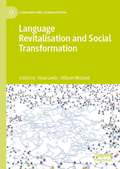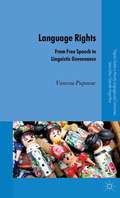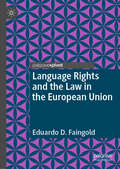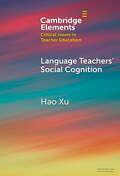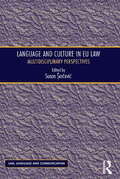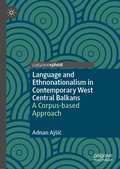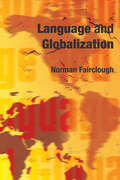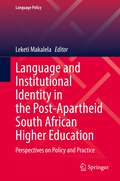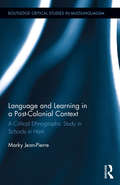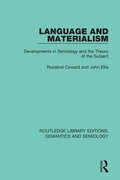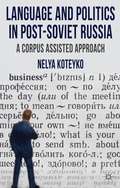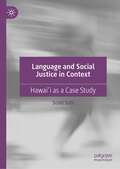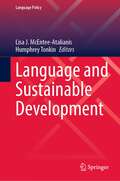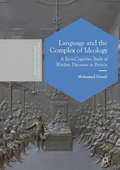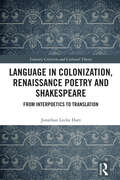- Table View
- List View
Language Policy and Political Issues in Education
by Teresa L. Mccarty Stephen MayLanguage has too often been studied in isolation from the social and political conditions in which it is used. The late David Corson, the General Editor of the first edition of the Encyclopedia of Language and Education, held the position that an acute understanding of theory was a necessary prerequisite for action, not an alternative to it, especially if one were hoping to change policies for the better. The contributions in this volume acknowledge the centrality of the politics of language, highlighting the importance of the social and political contexts of language policy and language education. This is one of ten volumes of the Encyclopedia of Language and Education. The Encyclopedia bears testimony to the dynamism and evolution of the language and education field, as it confronts the ever-burgeoning and irrepressible linguistic diversity and ongoing pressures and expectations placed on education around the world.
Language Policy as Practice: Advancing the Empirical Turn in Language Policy Research
by Florence Bonacina-PughThis edited book brings together original contributions from scholars working across Language Policy and Planning to advance the recent 'Empirical turn' that has taken place in the field. All the chapters in the volume show how Language Policy can be conceptualized 'as practice' in a variety of domains, ranging from the home to the workplace, schools, and higher education. The authors also suggest further theoretical, methodological, and empirical developments for the discipline in light of this epistemological shift. A Foreword and an Afterword shed light on the theoretical and empirical lineage of this volume and show how this book contributes to the humanization of Language Policy research. This book will be of interest to scholars and post-graduate students working across Language Policy and Planning, Language in Education Policy, and Family Language Policy, as well as those in adjacent fields including Education Policy, Classroom Discourse, Linguistic Anthropology, Sociologyof Education, and Multilingualism.
Language Policy at the Supranational Level: English and the ASEAN (Language Policy #37)
by Ian Hardy M. Obaidul Hamid Huan Yik LeeThis book provides a critical examination of the English-only policy of ASEAN, the Association of the ten Southeast Asian nations. It presents the ASEAN language policy and planning (LPP) journey through time: rationalising English as the sole working language for ASEAN in the past, followed by a critique of the status quo considering regional complexities and dynamics, and finally exploring alternative linguistic futures for ASEAN and the Southeast Asian region. The book also offers methodological innovations in LPP research by utilising the largely underrepresented and undervalued agency of 'people with expertise'. The authors argue for a multilingual commitment towards pursuing an agency of 'projectivity' in co-constructing imagined LPP possibilities to reflect the region's socio-historical context, socio-political intricacies, and socio-linguistic diversity. The way forward is a more inclusive, equitable, balanced, and responsible approach to LPP, both regionally and globally. The book engages with both deconstructive and constructive paradigms, offering promising proposals for dealing with key language issues and contemporary challenges. This book will be interesting reading for language and education scholars, sociolinguists, historians, political scientists, policymakers, diplomats, language activists, media personnel, business leaders, tourism players and other language policy and planning actors operating at national, sub-national and supra-national levels.
Language Policy in Ethiopia: The Interplay Between Policy and Practice in Tigray Regional State (Language Policy #24)
by Mekonnen Alemu YohannesThis book examines the interplay and tensions between hegemonic and counter-hegemonic language policy and processes in Tigray, a regional state of Ethiopia, in the period of pre- and post-1991. Viewing language use and language policy as dynamic social and ideological processes, the book presents Ethiopia as an example of language policy creation and implementation over time, in a highly volatile political context. The case of Ethiopia is unique in that different language policies and practices were put in place as the country’s leaders changed through political takeovers. Declared language policies were not always implemented, and those implemented were often protested. The book starts with an overview and review of language policy and planning, followed by a chapter on the history of such planning in Ethiopia. It then presents the methodology used for the study, and examines the appropriation of hegemonic LPP, patterns of resistance, schools and public sites as centers of resistance, and the emergence and development of specific patterns of language use in different regions of the country. The book ends with recommendations for future research, and draws the overall conclusion that since LPP is a dynamic and multilayered contextual process, official or de facto language policy is often undermined by overt or covert unofficial language policies, ideologies, mechanisms, and agents that result in different patterns of language use.
Language Policy in Superdiverse Indonesia (Routledge Studies in Sociolinguistics)
by Subhan ZeinIndonesia has an extreme diversity of linguistic wealth, with 707 languages by one count, or 731 languages and more than 1,100 dialects in another estimate, spoken by more than 600 ethnicities spread across 17,504 islands in the archipelago. Smaller, locally used indigenous languages jostle for survival alongside Indonesian, which is the national language, regional lingua francas, major indigenous languages, heritage languages, sign languages and world languages such as English, Arabic and Mandarin, not to mention emerging linguistic varieties and practices of language mixing. How does the government manage these languages in different domains such as education, the media, the workplace and the public while balancing concerns over language endangerment and the need for participation in the global community? Subhan Zein asserts that superdiversity is the key to understanding and assessing these intricate issues and their complicated, contested and innovative responses in the complex, dynamic and polycentric sociolinguistic landscape of Indonesia that he conceptualises as superglossia. This offers an opportunity for us to delve more deeply into such a context through the language and superdiversity perspective that is in ascendancy. Zein examines emerging themes that have been dominating language policy discourse including status, prestige, corpus, acquisition, cultivation, language shift and endangerment, revitalisation, linguistic genocide and imperialism, multilingual education, personnel policy, translanguaging, family language policy and global English. These topical areas are critically discussed in an integrated manner against Indonesia’s elaborate socio-cultural, political and religious backdrop as well as the implementation of regional autonomy. In doing so, Zein identifies strategies for language policy to help inform scholarship and policymaking while providing a frame of reference for the adoption of the superdiversity perspective on polity-specific language policy in other parts of the world.
Language Program Vitality in the United States: From Surviving to Thriving in Higher Education (Educational Linguistics #63)
by Scott Sterling Emily Heidrich Uebel Felix A. KronenbergThe perception of a permanent enrollment crisis in US postsecondary foreign language education has shaped our profession’s image for an entire generation of educators. Over the past 30 years, this crisis rarely invited self-examination or inspired creativity. Instead, it was routinely attributed to external factors: shrinking budgets, unsympathetic administrators, disengaged students. This volume is refreshingly optimistic: After providing a nuanced picture of the complex enrollment situation and focusing on perceptions of language education among undergraduate students, the volume features an inspiring panorama of successful models that revitalized language programs at a wide range of institutions. The diversity of approaches to post-secondary language education in the United States featured in this volume highlights that there are no simple “one size fits all” solutions. To be transformational, initiatives need to be intimately calibrated to the evolving needs and desires of our institutions’ most important stakeholder: the student. Per Urlaub, Massachusetts Institute of Technology, MA, USA
Language Revitalisation and Social Transformation (Language and Globalization)
by Huw Lewis Wilson McLeodThis book brings together an interdisciplinary group of academic researchers in order to examine how and to what extent the challenge of language revitalisation should be reassessed and reconceptualised to take account of our fast-changing social context. The period of four decades between 1980 and 2020 that straddled the end of the twentieth century and the beginning of the twenty-first is widely regarded as one that witnessed a series of fundamental social, economic and political transformations. Many societies have become increasingly individualistic, mobile and diverse in terms of ethnicity and identity; their economies have become increasingly interconnected; and their governance structures have become increasingly complex, incorporating a growing number of different levels and actors. In addition, rapid advancements with regard to automated, digital and communication technology have had a far-reaching impact on how people interact with each other and participate in society. The chapters in this book aim to advance an agenda of key questions that should concern those working in the field of language revitalisation over the coming years, and the volume will be of interest to students, scholars and policy-makers in related areas including sociolinguistics, education, sociology, geography, political science, law, economics, Celtic studies, and communication technology.
Language Rights
by Vanessa PupavacExploring language rights politics in theoretical, historical and international context, this book brings together debates from law, sociolinguistics, international politics, and the history of ideas. The author argues that international language rights advocacy supports global governance of language and questions freedoms of speech and expression.
Language Rights and the Law in the European Union
by Eduardo D. FaingoldThis book examines the language policies relating to linguistic rights in European Union law and in the constitutions and legal statutes of some European Union member states. In recent years, the European Union has seen an increase in claims for language recognition by minority groups representing a considerable population (such as Catalan in Spain and Welsh in the UK). Additionally, there is a developing situation surrounding the official use of English within the European Union in the aftermath of the Brexit vote. In light of these two contexts, this book focuses on the degree of legal protection afforded to linguistic groups in the European Union. It will be of interest to students and scholars of language policy, EU law, minority languages and sociolinguistics.
Language Teachers' Social Cognition (Elements in Critical Issues in Teacher Education)
by Hao XuThis Element aims to elucidate the theories of social cognition and to delineate their implications for the professional development of language teachers in primary and secondary schools. We first explore the concept of social cognition. The three key dimensions, that is, representation of social reality, social cognitive processing, and social mental abilities, of the social cognition theories are further elaborated with examples closely associated with language teaching and teacher development. We continue with more specific issues such as impression, attitude, emotion, and self-efficacy, which arise and develop as language teachers code, store, and retrieve information from social situations. We then discuss how social cognition influences teacher learning and development as observed and promoted within different social realities, and we end this Element with a call for a social-cognitive perspective on understanding language teachers' learning and development situated in diverse and changing contexts in and out of schools.
Language and Canadian Media
by Rachelle VesseyLanguage Ideologies and Canadian Media explores how French and English Canadian media discuss languages and language issues, which language ideologies predominate in English and French, and whether language ideologies in traditional news media are transferred to new and social media. Using corpus linguistics and discourse analysis and a variety of different datasets ranging from print newspapers to online news, commentary and Twitter, the author argues that language ideologies in Canadian media have a bearing not only on the extent to which Canadian language policies are adopted, but also on the very way that Canadians understand themselves and their place in the nation.
Language and Culture in EU Law: Multidisciplinary Perspectives (Law, Language and Communication)
by Susan ŠarčevićWritten by distinguished legal and linguistic scholars and practitioners from the EU institutions, the contributions in this volume provide multidisciplinary perspectives on the vital role of language and culture as key forces shaping the dynamics of EU law. The broad spectrum of topics sheds light on major Europeanization processes at work: the gradual creation of a neutralized EU legal language with uniform concepts, for example, in the DCFR and CESL, and the emergence of a European legal culture. The main focus is on EU multilingual lawmaking, with special emphasis on problems of legal translation and term formation in the multilingual and multicultural European context, including comparative law aspects and an analysis of the advantages and disadvantages of translating from a lingua franca. Of equal importance are issues relating to the multilingual interpretation of EU legislation and case law by the national courts and interpretative techniques of the CJEU, as well as the viability of the autonomy of EU legal concepts and the need for the professionalization of court interpreters Union-wide in response to Directive 2010/64/EU. Offering a good mix of theory and practice, this book is intended for scholars, practitioners and students with a special interest in the legal-linguistic aspects of EU law and their impact on old and new Member States and candidate countries as well.
Language and Development in Africa
by H. Ekkehard WolffDevelopment is based on communication through language. With more than two thousand languages being used in Africa, language becomes a highly relevant factor in all sectors of political, social, cultural and economic life. This important sociolinguistic dimension hitherto remains underrated and under-researched in 'Western' mainstream development studies. The book discusses the resourcefulness of languages, both local and global, in view of the ongoing transformation of African societies as much as for economic development. From a novel 'applied African sociolinguistics' perspective it analyses the continuing effects of linguistic imperialism on postcolonial African societies, in particular regarding the educational sector, through imposed hegemonic languages such as Arabic and the ex-colonial languages of European provenance. It offers a broad interdisciplinary scientific approach to the linguistic dimensions of sociocultural modernisation and economic development in Africa, written for both the non-linguistically trained reader as much as for the linguistically trained researcher and language practitioner.
Language and Ethnonationalism in Contemporary West Central Balkans: A Corpus-based Approach
by Adnan AjšićThis book uses a specialized corpus of public language-related discourse to investigate links between language ideologies and ethnonationalism in contemporary West Central Balkans. Despite a century and a half of shared linguistic history, the nations making up the central part of former Yugoslavia continue to debate the ownership over the common language, creating much animosity, some legal issues, and often absurd circumstances. At the heart of the ongoing language debate over Central South Slavic is the belief in language as the cornerstone of ethnonational identity and the legitimacy of ethnic groups’ claims to sovereignty. Given a history of conflict and the recent resurgence in extreme ethnonationalism, an understanding of ethnolinguistic contestation in the region is as important as ever. This book will be of interest to social scientists working in fields as diverse as (applied) linguistics, anthropology, media studies, political science, sociology and history, as well as other scholars with an interest in language and society.
Language and Globalization
by Norman FaircloughLanguage and Globalization explores the effects of language in the processes of globalization. Norman Fairclough adopts the approach of combining critical discourse analysis with cultural political economy to develop a new theory of the relationship between discourse and other dimensions of globalization. Using examples from a variety of countries such as the USA, Britain, Romania, Hungary and Thailand, Language and Globalization shows how the analysis of texts can be coherently integrated within political economic analysis. Fairclough incorporates topical issues such as the war on terror and the impact of the media on globalization into his discussion. Areas covered include: globalization and language: review of academic literature discourses of globalization the media, mediation and globalization globalization, war and terrorism. This book will be of interest to students and researchers in applied linguistics, language and politics and discourse analysis.
Language and Institutional Identity in the Post-Apartheid South African Higher Education: Perspectives on Policy and Practice (Language Policy #27)
by Leketi MakalelaThis book examines the intersections between education, identity formation, and language in post-apartheid South Africa with specific attention to higher education. It does so against the backdrop of the core argument that the sector plays a critical role in shaping, (re)producing and perpetuating sectoral, class, sub-national and national identities, which in turn, in the peculiar South African setting, are almost invariably analogous with the historical fault lines determined and dictated by language as a marker of ethnic and racial identity. The chapters in the book grapple with the nuances related to these intersections in the understanding that higher education language policies – overt and/or covert – largely structure institutional cultures, or what has been described as curriculum in higher education institutions. Together, the chapters examine the roles played by higher education, by language policies, and by the intersections of these policies and ethnolinguistic identities in either constructing and perpetuating, or deconstructing ethnolinguistic identities upon which the sector was founded. The introductory chapter lays out the background to the entire book with an emphasis on the policy and practice perspectives on the intersections. The middle chapters describe the so-called “White Universities”, “Black Universities” and “Middle-Man Minorities Universities”. The final chapter maps out future directions of the discourses on language and identity formation in South Africa’s higher education.
Language and Learning in a Post-Colonial Context: A Critical Ethnographic Study in Schools in Haiti (Routledge Critical Studies in Multilingualism)
by Marky Jean-PierreThis book explores the social, political, and historical forces that mediate language ideology and practices in post-colonial education and how such ideology and practices influence students’ academic achievement. Jean-Pierre provides empirical evidence that a relationship exists between language practices and school underperformance. He takes Haiti as the focus of study, finding that students and teachers experience difficulty constructing knowledge in a setting in which the language they speak at home (Creole) differs from the language of instruction (French). The research is based on ethnographic data collected in classrooms in both private and public school settings in addition to different sectors of the society (e.g. state and private institutions).
Language and Materialism: Developments in Semiology and the Theory of the Subject (Routledge Library Editions: Semantics and Semiology #5)
by John Ellis Rosalind CowardFirst published in 1977, this book presents a comprehensive and lucid guide through the labyrinths of semiology and structuralism — perhaps the most significant systems of study to have been developed in the twentieth century. The authors describe the early presuppositions of structuralism and semiology which claim to be a materialist theory of language based on Saussure’s notion of the sign. They show how these presuppositions have been challenged by work following Althusser’s development of the Marxist theory of ideology, and by Lacan’s re-reading of Freud. The book explains how the encounter of two disciplines — psychoanalysis and Marxism — on the ground of their common problem —language — has produced a new understanding of society and its subjects. It produces a critical re-examination of the traditional Marxist theory of ideology, together with the concepts of sign and identity of the subject.
Language and Politics in Post-Soviet Russia
by Nelya KoteykoLanguage and Politics in Post-Soviet Russia critically examines the uses of language in post-Soviet media and political texts between 1998 and 2007. It will be of interest to academics and researchers in the fields of media studies, discourse analysis, corpus linguistics, and scholars in Russian Studies.
Language and Revolution: Making Modern Political Identities (Cummings Center Series #Vol. 16)
by Igal HalfinThis work examines the role of language in forging the modern subject. Focusing on the idea of the "New Man" that has animated all revolutionaries, the present volume asks what it meant to define oneself in terms of one's class origins, gender, national belonging or racial origins.
Language and Social Justice in Context: Hawaiʻi as a Case Study
by Scott SaftThis book builds on recent research exploring the intersection between language and social justice, using the multilingual context of Hawai'i as a case study. The author offers a discourse-centered approach, providing analyses of actual instances of language use, and argues that the wide range of languages in Hawai'i - Hawaiian, Pidgin, Japanese, Chinese, Tagalog, Ilocano, Marshallese, and Chuukese, as well as the phenomenon of language mixing - all have a significant contribution to make to society. The book also draws on language acquisition research demonstrating positive long-term effects of exposure to multiple languages, and makes the case for educational approaches that foster multilingual abilities among the young members of society. This book will be relevant for academics interested in the intersection of language and social justice and languages in Hawaiʻi, but it should also be of interest to undergraduate and especially graduate students in sociolinguistics, language revitalization and language documentation, discourse analysis, applied linguistics, and pragmatics.
Language and Sustainable Development (Language Policy #32)
by Humphrey Tonkin Lisa J. McEntee-AtalianisThis book addresses the importance of language in matters of sustainability and incorporating such concerns in implementing the UN’s Sustainable Development Goals (SDGs). Sustainable language policy must aim to include all groups, including language minorities and marginalized populations, such as refugees and aid recipients, in conditions that allow for their inclusion in making and implementing policy. The book brings together nine studies covering such topics as language and digital resources, sustainable and inclusive multilingual education, national language policy, and language in peacekeeping operations. A final chapter addresses the crucial intersection between sociolinguistics and economics, and the implications of this for development and the SDGs.
Language and the Complex of Ideology: A Socio-Cognitive Study of Warfare Discourse in Britain (Postdisciplinary Studies in Discourse)
by Mohamed DouifiThis book undertakes a systematic analysis of the workings of ideology in discourse, using an interdisciplinary approach that links language, cognition and society. Through examination of two corpora - a collection of British newspaper articles and a set of political speeches - the author examines Britain's involvement in the Iraq War (2003), and critically assesses the language practices which constructed a pro-war ideology under Tony Blair's premiership. Drawing on a constellation of concepts from van Dijk's socio-cognitive model, this book carries out both qualitative and quantitative analyses and conceptualises discourse as a nonlinear, highly discursive and socio-cognitive phenomenon. This innovative work will appeal to students and scholars of Cognitive Linguistics, Quantitative Linguistics, Social Constructivism, Critical Discourse Analysis, Political Sciences and Communication Studies.
Language death
by David CrystalThe rapid endangerment and death of many minority languages across the world is a matter of widespread concern, not only among linguists and anthropologists but among all interested in the issues of cultural identity in an increasingly globalized culture. A leading commentator and popular writer on langauge issues, David Crystal asks the fundamental question, "Why is language death so important?", reviews the reason for the current crisis, and investigates what is being done to reduce its impact. By some counts, only 600 of the 6,000 or so languages in the world are "safe" from the threat of extinction. By some reckonings, the world will, by the end of the twenty-first century, be dominated by a small number of major languages. Language Death provides a stimulating and accessible account of this alarming trend, which, like the large-scale destruction of the environment, is both peculiarly modern and increasingly global. Language Death includes intelligent argument and moving descriptions of the decline and demise of particular languages, as well as practical advise for anyone interested in pursuing the subject further. David Crystal is a leading authority on language, and author of many books, including most recently Language and the Internet, (Cambridge, 2001). He is author or editor of several other books with Cambridge, including the Cambridge Encyclopedia of Language (1997), Cambridge Encyclopedia of the English Language (1995), English as a Global Langauge (1997), Language Death (2000); and Words on Words (University of Chicago, 2000). An internationally renowned writer, journal editor, lecturer and braodcaster, he received an Order of the British Empire in 1995 for his services to the English language.
Language in Colonization, Renaissance Poetry and Shakespeare: From Interpoetics to Translation (Literary Criticism and Cultural Theory)
by Jonathan Locke HartLanguage is the central concern of this book. Colonization, poetry and Shakespeare – and the Renaissance itself – provide the examples. I concentrate on text in context, close reading, interpretation, interpoetics and translation with particular instances and works, examining matters of interpoetics in Renaissance poetry and prose, including epic, and the Hugo translation of Shakespeare in France and trying to bring together analysis that shows how important language is in the age of European expansion and in the Renaissance. I provide close analysis of aspects of colonization, front matter (paratext) in poetry and prose, and Shakespeare that deserve more attention. The main themes and objectives of this book are an exploration of language in European colonial texts of the “New World,” paratexts or front matter, Renaissance poetry and Shakespeare through close reading, including interpoetics (liminality), translation and key words.
